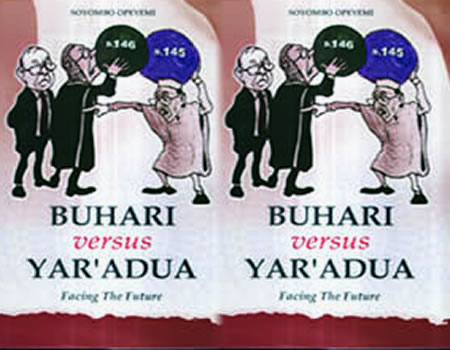A review of Opeyemi Soyombo’s book, Buhari v Yar’Adua: Facing the Future by Kayode Babatunde Oyende.
THE book, Buhari v Yar’Adua: Facing the Future is mainly a collection of articles written by the author about the 2007 general election which the current president Muhammadu Buhari lost to former President Yar’Adua of blessed memory. The articles, amongst others, have as their subject matter the comments of the author on the electoral contest or litigation which came after the loss and the resolution of the electoral disputes, one way or the other both at the Presidential Election Petitions Tribunal and at the Supreme Court of Nigeria.
The case referred to above is Buhari v INEC & others (2008) 19 NWLR (part 1120) 419 decided at the Supreme Court. The suit originated at the Court of Appeal via a petition presented by General Mohammadu Buhari, the then presidential candidate of the All Nigeria Peoples Party (ANPP).
The book contains 179 pages of readable prose. It is compelling and irresistible, written in clear analytical prose, witty, pungent and very frank.
Chapter One discusses the case of Buhari v Yar’adua (2008) and the consequence of the non-serialisation of the ballot papers used in the conduct of that election.
Chapter Two is titled ‘A judicial coup’. It discusses tenure extension judgment of the courts in some states of the Federation, the Code of Conduct Bureau and the power of the Attorney-General of the Federation, and the power play which prevented the then Vice-President, Dr. Goodluck Jonathan from taking over power in the absence of his boss.
Chapter Three discusses the case of Aregbesola v Oyinlola (2010). This case itself is topical as it reminds us of the tussle in the case Nwobodo v CC Onoh (1984) I SCNLR 1 and the volte face by Chief FRA Williams in Ajasin v Omoboriowo ( 1984). The legal tussle had to do with whether the standard of proof required in an election petition containing averments which border on a criminal allegation is proof beyond reasonable doubt or proof bordering on the balance of probabilities.
Chapter four contains reflections of the author on the interpretation of some sections of the Constitution particularly Section 308, which dwells on immunity being enjoyed by public officers, and the case of AG Lagos State v AG Federation and 35 ors on the constitutionality of the withholding of the revenue allocation to Lagos State by the Federal Government.
Chapter Five discusses the proposal to amend the 1999 Constitution and the controversy on whether a presidential assent by way of a signature is required before the 1999 Constitution can be validly amended under sections 9 (2) and 58 of the Constitution, a highly technical area. (See sections 9(2) and 58 of the 1999 Constitution. )
Chapter six discusses the role of the Supreme Court in safeguarding our democracy. This is via the constitutional power given under Section Six of the Constitution to adjudicate over disputes between individuals and governments and to decide disputes between the states and the federal government in a federation. How has the Supreme Court fared in this regard? The author’s analysis of the case of Buhari v INEC once again is instructive and he delivers an incisive post-election analysis based on the dissenting judgment of Oguntade, JSC (retired) and in the case of Swem v Dzungwe (1966) NMLR 297. Briefly the latter case was about an appeal filed by the 1st Respondent (an NPC candidate) against the Appellant (an UPGA candidate) asking that the election of the latter to the House of Representatives should be declared invalid on the grounds of substantial irregularities and non-compliance with the Electoral Act of 1962.
The court held, amongst other issues, that once a petitioner establishes non-compliance and the court or other tribunal cannot say whether or not the result of the election could have been affected by such non-compliance, the election will be voided on the ground that civil cases are proved by a preponderance of accepted evidence (emphasis supplied). In Buhari v INEC ( or Buhari v Yar’Adua), the proof required by the Court of Appeal was proof beyond reasonable doubt! The authority of Swem v Dzungwe cited above pointed the way forward over forty years ago! This is the burden that the author sought to discharge in this book and in my view, he discharged it creditably.
Finally, Chapter Seven discusses the prognosis of the former Editor of This Day, Godwin Agbroko and his predictions. The author delivers a powerful citation on the qualifications of a social critic.
Now to the ‘meat’ of the book. The bone of contention is the interpretation of s 146(1) of the Electoral Act 2006. The section states thus: “An election shall not be liable to be invalidated by reason of non-compliance with the provisions of this Act if it appears to the Electoral Tribunal or court that the election was conducted substantially in accordance with the principles of this Act and that the non-compliance did not affect substantially the result of the election”.
Here, Soyombo Opeyemi breaks down the meaning of this section in a readable and witty manner. He compares section 146 (1) quoted above with section 145 (1) (b) of the Electoral Act.
Now, non-compliance with the provisions of this section is to be measured by its weight in the mind of the judge when evaluating the evidence adduced by the petitioner and in particular the defence adduced by the respondent to debunk the evidence of the petitioner.
Where the non-compliance comes from corrupt practices, section 145 (2) provides the answer. S 45(2) of the Electoral Act 2006 provides: Ballot boxes shall be bound in booklets and numbered serially. This provision is mandatory and not merely for audit purpose.
This was not the procedure adopted in the election that was being challenged by Muhammadu Buhari and the petitioner proved this…
The decision of the Election Petitioner Tribunal was affirmed by Niki Tobi, JSC (retd.) who held that the petitioner had not proved his case and that the case must be dismissed for substantial non-compliance! However, solace must be found in the dissenting judgment of Oguntade JSC earlier discussed above who referred to the case of Swem v Dzungwe and the principles of a fair electoral contest which are reiterated as follows:
(1) Inclusiveness- all persons must be eligible to vote and should not be precluded from voting.
(2) Transparency- ballot papers are to be serialised and bound in booklets.
(3) Secrecy- voting is to be by open-secret ballot. See section 53 (1) Electoral Act 2006.
Where these three principles are absent, the election is a sham and lacks credibility.
Buhari v Yar’Adua: Facing The Future is, therefore, very timely and a warning to INEC and all the political parties and politicians to get their acts together and learn lessons from the past.
However, the author seemed to prefer the standard English spellings but some words are spelt in the American spelling. For example, serialising (page 19); sync is wrongly spelt (page 43), ‘lean’ ought to be learn (page 83).
For engaging these issues robustly and courageously and despite being a media practitioner, the author deserves a lot of commendation. It is a book that is highly recommended and a must for all citizens interested in the reform of our electoral system and the judiciary. It should also adorn our private collections in our homes and the public libraries and educational institutions.
- Dr Oyende is a lecturer in the Faculty of Law, Lagos State University ([email protected])






